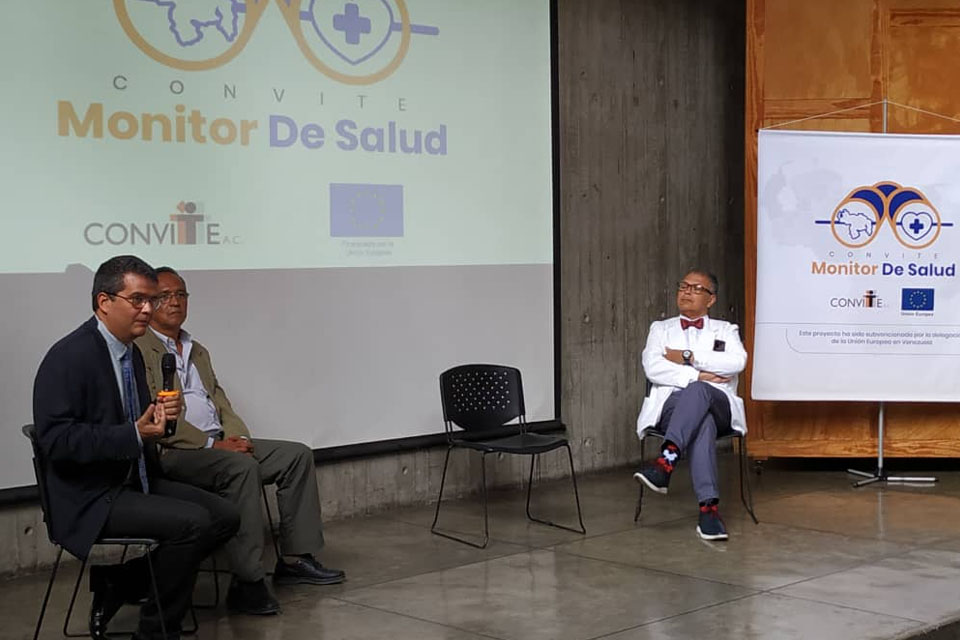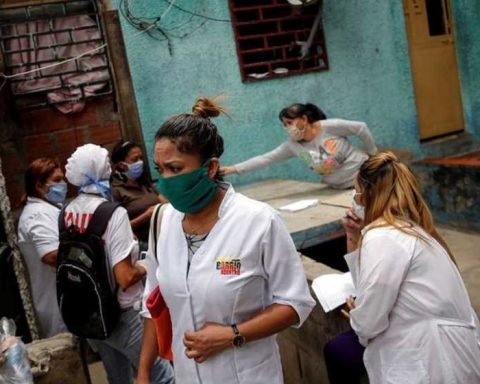The flaws in the Expanded Immunization Program make the Venezuelan population more vulnerable to diseases such as influenza, chicken pox, hepatitis, meningococcus or rubella. The lack of epidemiological information also influences the early detection and care of this type of disease preventable by vaccines
The Convite organization, together with several public health experts, presented on Thursday, May 19, its Health Monitor and the Alternative Epidemiological Monitoring System (SAME), where they warned of new outbreaks of vaccine-preventable diseases, due to the failures of the Plan Expanded Immunizations (PAE).
Doctor Andrés Barreto, SAME coordinator, explained that Convite monitoring is done in the states of Anzoátegui, Apure, Delta Amacuro, the Capital District, Guárico, Mérida, Táchira and Zulia. The state of Sucre was part of the monitoring until December 2021, when “due to pressure” the researchers abandoned the project.
The results presented by Barreto, compiled between July 2021 and March 2022, show a “normal” incidence of diseases transmitted by vectors (mosquitoes), despite the cases of dengue reported in Zulia and Táchira, two states where this disease was eradicated .
He also mentioned diarrhea, amebiasis and acute hepatitis A as the main diseases transmitted by food and water, while airborne pathologies reflect the behavior of the covid-19 epidemic in the country, with peaks between December 2021 and January. from 2022, and then a drop from February this year.
*Also read: In the Americas there are 33 probable cases of severe acute hepatitis in children
Barreto made a special alert about the presence of tuberculosis, since cases were registered in the eight monitored states, especially in Zulia.
On other vaccine-preventable diseases, the doctor highlighted the increase in chickenpox (258 cases), which causes blisters, itching, fatigue and fever. Between December 2021 and March 2022, an outbreak was identified that began in the Andean states (Mérida and Táchira) and then spread to the Capital District and other entities.
#HealthMonitor | ? Forum ‘Public access to epidemiological information in Venezuela’.
?️?️Dr. Andrés Barreto: “While in other countries they show their epidemiological bulletins properly, here in Venezuela they hide.”
— Convite AC (@conviteac) May 19, 2022
The SAME coordinator also explained that cases of rubella and neonatal tetanus were reported in Zulia, while several cases of tetanus were reported in Táchira. In October 2021, outbreaks of viral hepatitis were reported.
Convite monitoring also includes sexually transmitted infections. The doctor highlighted that the main infection of this type reported in the states was candidiasis (545 cases), followed by HIV, syphilis and HPV.
Barreto expressed his concern due to the number of detected cases of congenital syphilis (166). “The diagnosis of the disease is being made with children, so it is evident that there is underreporting, since we have 172 cases in adults, but couples must also be included.”
“There is a problem of registration and disclosure of information. There is a latent threat of outbreaks of endemic and vaccine-preventable diseases”, acknowledged the doctor.
Poor immunization = more diseases
Huniades Urbina, pediatrician and secretary of the National Academy of Medicine, recalled that, according to the World Health Organization (WHO), the fall in vaccination coverage was to be expected during the pandemic, but after two years the Venezuelan authorities have not made corrections to improve immunization rates.
“Here they have not understood that if the mothers manage to get to the covid vaccination centers, they should give the rest of the vaccines,” he said.
By 2017 there was already 83.3% shortage, that is, there was no vaccine for 12 of the 16 diseases that are included in the Venezuelan Expanded Immunization Plan. By 2020, the situation worsened as vaccination coverage fell to 41.3% according to the WHO.
He gave as an example the failures in BCG (tuberculosis) coverage for 2020 was 82%, when it should be between 90 and 95% to be optimal, although according to figures from the Ministry of Health it was actually 75%.
The coverage of polio vaccines, about which the Academy launched an alert days ago, is 62%; while for hepatitis B it barely reached 50%.
*Also read: HPV in Venezuela, a public health problem with vaccines but without attention
The pediatrician also emphasized that “due to a lack of will” new vaccines have not been included -such as HPV- in the PAE and neither have rotavirus and pneumococcus immunizations been purchased, which have been included in the Program for six years.
Information is key
For his part, the President of the Venezuelan Society of Infectious Diseases, Manuel Figuera, recalled the importance of epidemiological surveillance to track diseases and solve national health problems.
He said that this was largely experienced with the covid-19 pandemic. “For example, from the point of view of data, six million deaths have been reported these two years, but when we evaluate the excess mortality is 15 million. Are all these deaths due to covid? No, but perhaps there are more deaths reported and the impact is seen in people with diseases that were affected by covid.
The problem in Venezuela, said the infectologist, “is that it seems that reaching the diagnosis of the problem is not important. In the last two decades, we have had infectious problems that have not been adequately treated ».
#HealthMonitor | ? Forum ‘Public access to epidemiological information in Venezuela’.
?️?️Dr. Manuel Figuera: “Within the epidemiological impact, we can know the relevance of each disease.”
— Convite AC (@conviteac) May 19, 2022
He emphasized that andIt is the constitutional duty of government to care for health, and part of that is to find out and report illnesses. He recalled that since 2016 there has been no publication of the national epidemiological bulletin “because there is no interest in knowing the information.”
He also recalled that the mortality yearbooks have not been published. “What happens if we walk blindly? We have figures that we believe or do not believe, as is the case with covid.”
The infectologist also pointed out that the reemergence of some diseases, such as diphtheria, are a direct indicator of failure in vaccination coverage. “There is interest from different parties to solve problems with a team vision, but if we have two years with a covid pandemic where they did not take us into account, it shows that there is no interest in solving problems.”
Post Views:
18
















